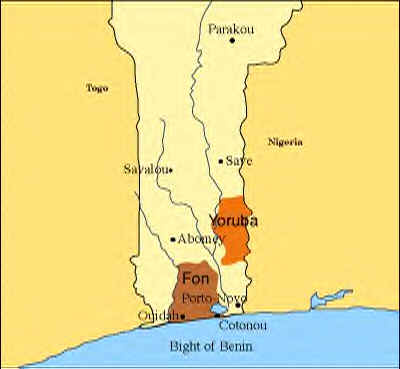

Bénin Information |

![]() General
Information for Bénin
General
Information for Bénin
| Country: | Bénin |
| Location: | West Africa |
| Independence: | 1960 |
| Nationality: | Béninese |
| Capital City: | Porto Novo |
| Population: | 5,522,677 |
| Important Cities: | Cotonou, Parakou, Ouidah |
| Head of State: | Mathieu Kerekou |
| Area: | 112,620 sq.km. |
| Type of Government: | Republic |
| Currency: | 500 FCFA=1 USD |
| Major peoples: | Fon,Adja,Yoruba,Bariba |
| Religion: | African religion 70%, Muslim 15%, Christian 15% |
| Climate: | Tropical |
| Literacy: | 23% |
| Official Language: | French |
| Principal Languages: | Fon,Yoruba, Adja,Bariba |
| Major Exports: | Cotton, Palm Products |
| Pre-Colonial History | In the precolonial era, Bénin was a collection of small, often warring principalities, the most powerful of which was the Fon Kingdom of Dahomey (with its capital at Abomey), founded in the 17th century. In the 17th and 18th centuries, first the Portuguese and later other European powers established trading posts along the coast, notably at Porto Novo and Ouidah. They traded firearms and luxury items to the Kings of Dahomey and other states for slaves, who were shipped to the New World, primarily to Brazil and the Caribbean. This part of west Africa became known in the 18th and 19th centuries as the Slave Coast. Northern Bénin traded primarily with other Africans and Arabs in the Sahel region and thus experienced limited European influence. France led efforts to suppress the slave trade, beginning in the mid-19th century. These efforts, along with expansion into Africa by European colonial empires, led to alliances with some local peoples and warfare with others. In 1892, the King of Dahomey was defeated and the country organized as the French protectorate of Dahomey. Dahomey remained a French colony until 1960. |
| Post-Colonial History | Bénin became independent on August 1, 1960. In the early years of independence, the nation was plagued by political instability, including many coups d'état and changes of government. The last change took place on October 26, 1972, when a group of officers seized control of the government. A military revolutionary government was established with a cabinet composed primarily of military officers. Then Major Mathieu Kerekou was named chief of state in 1972. The Kerekou government, with the support of Bénin's Marxist intellectuals, soon began a process of revolutionary change attempting to restructure the government, the economy, and the society along Marxist-Leninist lines. In 1977, a group of mercenaries landed at the Cotonou airport to carry out a coup d'état. They were quickly repulsed after fighting. Elections to the first National Revolutionary assembly were held in November 1979, and the assembly elected Mathieu Kerekou president of the country in 1980. |